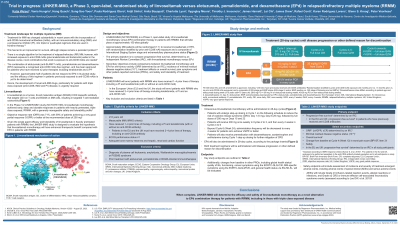Cellular and T cell engager Immunotherapy
Poster Session 1
P-052: LINKER-MM3, a Phase 3, Open-Label, Randomized Study of Linvoseltamab Versus Elotuzumab, Pomalidomide, and Dexamethasone (EPd) in Relapsed/Refractory Multiple Myeloma (RRMM)
Wednesday, September 27, 2023
1:30 PM - 2:30 PM EEST


Katja Weisel, MD (she/her/hers)
Deputy Director
University Medical Center of Hamburg-Eppendorf, Hamburg, Germany
Hamburg, Germany
Introduction: Trial in Progress.
Frontline treatment for multiple myeloma (MM) often utilizes combinations of 2–4 classes of active drugs, including an immunomodulatory drug, a proteasome inhibitor (PI), and an anti-CD38 mAb. However, relapse is a persistent problem and there is no single treatment algorithm for RRMM. Pomalidomide-based regimens are available for RRMM, with those that avoid reuse of anti-CD38 mAbs assuming greater importance following the positioning of these mAbs in frontline therapy. EPd is a recognized anti-CD38 mAb-free combination, although only ~50% of patients (pts) with RRMM responded to EPd in a pivotal study. The need for drugs that have new mechanisms of action is thus important, particularly for triple-class exposed (TCE) RRMM.
Linvoseltamab is a BCMA×CD3 bispecific antibody that induces T-cell-mediated cytotoxicity of BCMA-expressing MM cells. In the Phase 1/2 LINKER-MM1 study, linvoseltamab monotherapy achieved early, deep, and durable responses in pts with TCE RRMM, with a manageable safety profile (Bumma, et al. ASH, 2022). Considering these positive data and the current unmet need, we aim to assess the utility of linvoseltamab monotherapy as a novel alternative treatment relative to a standard pomalidomide-based triplet therapy for pts with RRMM in the LINKER-MM3 study.
Methods: LINKER-MM3 (NCT05730036) is a Phase 3, open-label, randomized study of linvoseltamab monotherapy vs EPd combination therapy in pts with RRMM. Pts will have received 1–4 prior lines of therapy (2–4 in the EU and UK), including lenalidomide and a PI, and have progressed on/after last therapy. In the EU and UK, pts must also have had prior anti-CD38 mAb treatment. Other key eligibility criteria include measurable disease per 2016 IMWG criteria; ≥18 years of age; adequate bone marrow reserves and hepatic, renal, and cardiac function; and no prior treatment with elotuzumab, pomalidomide, or BCMA-directed immunotherapies.
Linvoseltamab will be given in 28-day cycles, with step-up dosing to the full dose undertaken during Cycle 1. EPd treatment will also be given in 28-day cycles, according to the package inserts. Both treatment regimens will be given until disease progression or another defined reason for drug discontinuation.
The study will take place at ~180 sites globally. A total of ~300 pts will be randomized (1:1) to IV linvoseltamab or EPd, stratified by prior anti-CD38 mAb exposure, International Staging System stage, and extramedullary plasmacytoma status.
The primary endpoint is progression-free survival per IMWG criteria, determined by independent review committee (IRC). Key secondary endpoints are objective response rate (including rates of very good partial response or better and complete response or better, determined by IRC); MRD status; overall survival; and change in pain at Week 12 (Brief Pain Inventory-Short Form, Item 3). Incidence/severity of treatment-emergent AEs will also be assessed.
Study enrollment is planned to begin in Q3 2023.
Results: n/a
Conclusions: n/a
Frontline treatment for multiple myeloma (MM) often utilizes combinations of 2–4 classes of active drugs, including an immunomodulatory drug, a proteasome inhibitor (PI), and an anti-CD38 mAb. However, relapse is a persistent problem and there is no single treatment algorithm for RRMM. Pomalidomide-based regimens are available for RRMM, with those that avoid reuse of anti-CD38 mAbs assuming greater importance following the positioning of these mAbs in frontline therapy. EPd is a recognized anti-CD38 mAb-free combination, although only ~50% of patients (pts) with RRMM responded to EPd in a pivotal study. The need for drugs that have new mechanisms of action is thus important, particularly for triple-class exposed (TCE) RRMM.
Linvoseltamab is a BCMA×CD3 bispecific antibody that induces T-cell-mediated cytotoxicity of BCMA-expressing MM cells. In the Phase 1/2 LINKER-MM1 study, linvoseltamab monotherapy achieved early, deep, and durable responses in pts with TCE RRMM, with a manageable safety profile (Bumma, et al. ASH, 2022). Considering these positive data and the current unmet need, we aim to assess the utility of linvoseltamab monotherapy as a novel alternative treatment relative to a standard pomalidomide-based triplet therapy for pts with RRMM in the LINKER-MM3 study.
Methods: LINKER-MM3 (NCT05730036) is a Phase 3, open-label, randomized study of linvoseltamab monotherapy vs EPd combination therapy in pts with RRMM. Pts will have received 1–4 prior lines of therapy (2–4 in the EU and UK), including lenalidomide and a PI, and have progressed on/after last therapy. In the EU and UK, pts must also have had prior anti-CD38 mAb treatment. Other key eligibility criteria include measurable disease per 2016 IMWG criteria; ≥18 years of age; adequate bone marrow reserves and hepatic, renal, and cardiac function; and no prior treatment with elotuzumab, pomalidomide, or BCMA-directed immunotherapies.
Linvoseltamab will be given in 28-day cycles, with step-up dosing to the full dose undertaken during Cycle 1. EPd treatment will also be given in 28-day cycles, according to the package inserts. Both treatment regimens will be given until disease progression or another defined reason for drug discontinuation.
The study will take place at ~180 sites globally. A total of ~300 pts will be randomized (1:1) to IV linvoseltamab or EPd, stratified by prior anti-CD38 mAb exposure, International Staging System stage, and extramedullary plasmacytoma status.
The primary endpoint is progression-free survival per IMWG criteria, determined by independent review committee (IRC). Key secondary endpoints are objective response rate (including rates of very good partial response or better and complete response or better, determined by IRC); MRD status; overall survival; and change in pain at Week 12 (Brief Pain Inventory-Short Form, Item 3). Incidence/severity of treatment-emergent AEs will also be assessed.
Study enrollment is planned to begin in Q3 2023.
Results: n/a
Conclusions: n/a
